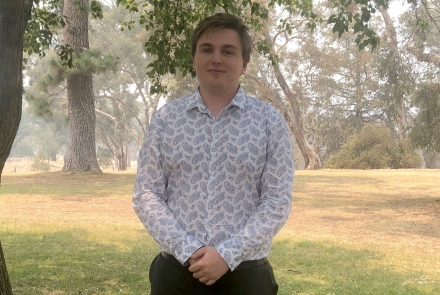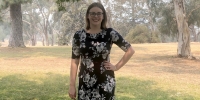
2020 Congressional Research Fellowship Program: an international future policy professional
ANU graduate Will Palmer is set to join Crawford School student Lisa Butson on a journey to Washington DC, where they will have a unique opportunity to enhance their public policy skills through a three-month stint in a United States Senator’s office.
As outstanding ANU students, Will and Lisa were chosen from dozens of candidates who applied for the 2020 Congressional Research Fellowship Program (CRFP). They will now be able to get valuable insights into the US political system, including how policy is shaped by the political process, citizen-democracy, interest groups, and the media.
From January to March 2020, they will be placed in the offices of US Senators who serve on the Senate Committees on Foreign Relations and Armed Services. The fellows will also have the opportunity to engage with leading foreign policy, security and economics think tanks in Washington.
Before their departure for Washington, Will paid a visit to Crawford School to discuss this exciting project in detail and tell us more about his studies, working experiences in policy, and what he’s hoping to gain from the fellowship program.
What is your background?
I’m originally from the Gold Coast, but I moved to Canberra to come to ANU just after I turned 17. I graduated with a Bachelor of Politics, Philosophy and Economics with Honours at the end of 2018, with a focus on quantitative data collection and analysis in a social sciences and politics settings. I now work for the Bureau of Statistics, and my partner and I have a pony named Gus (though I’m a bit too tall to ride him, and mostly just feed him carrots).
What did you study at ANU?
I studied the Politics, Philosophy and Economics degree at ANU, with an honours year. In politics, I leaned towards quantitative political science, in the philosophy aspect I studied mostly ethics and moral philosophy, and to top it off I focused on political economy in my economics courses. My honours thesis was a quantitative analysis of the economic and socio-demographic variables that affected voting for minor parties in the Senate during the 2016 Australian Federal Election.
What do you like most about policy-making?
I like the ability to positively impact people’s lives the most. Being able to tie a hard day’s work directly to a good outcome for someone through a policy being effective and working well is an immensely satisfying experience, and it is an absolute privilege that I have been able to experience that this early in my career.
Why did you decide to apply for this fellowship?
I’ve always been the kind of person to jump on any opportunities that I can see, and this fellowship for me is a massive opportunity. I have always worked on the implementation side of policy, so this fellowship allows me to not only greatly enhance my knowledge of the US-Australian relationship, but really see what kinds of behaviours and factors go into policy creation and design.
Have you ever been to the US and what makes this journey so exciting for you?
I’ve been there a couple of times, but only as a tourist. I’ve been to the West Coast twice, and once to the East Coast last year. It’s very exciting for me because it is an opportunity to get a much greater picture of what life in America is actually like, and to get an up-close and personal look at their political process.
What does this fellowship opportunity mean to you as a future policy professional?
This fellowship means a great opportunity to flesh out my knowledge of the US-Australian relationship, not just from the Australian perspective but from the American perspective too. It means that for my future policy career I’ll have a much wider range of skills I can apply, and an international perspective not simply from theory, but from experience.
What do you expect to gain from working in a US Senator’s office?
Working in a US Senators office will provide me a great opportunity to see what kinds of information and factors play into political actors’ decisions to support (or not) policy. It will also enable me to see how they choose to frame these policies. The main purpose of my current workplace, the ABS, is to inform Australia’s important decisions. So, having an insight into how data affects the decision-making process first-hand is an extremely valuable skill to obtain.
Have you previously worked in a policy-facing role?
At the end of 2017, I worked for three months in the Department of Infrastructure in the Regional and Remote Aviation Section. That was very much on the front line of policy implementation and had a clear and direct positive impact on Australia. Where I work at the moment, in the ABS, there is still policy-facing, though it’s a bit more abstract, as I work on the Time Use Survey, and help to ensure that the data we collect will provide valuable evidence to policymakers and data-users.
Updated: 18 July 2024/Responsible Officer: Crawford Engagement/Page Contact: CAP Web Team












